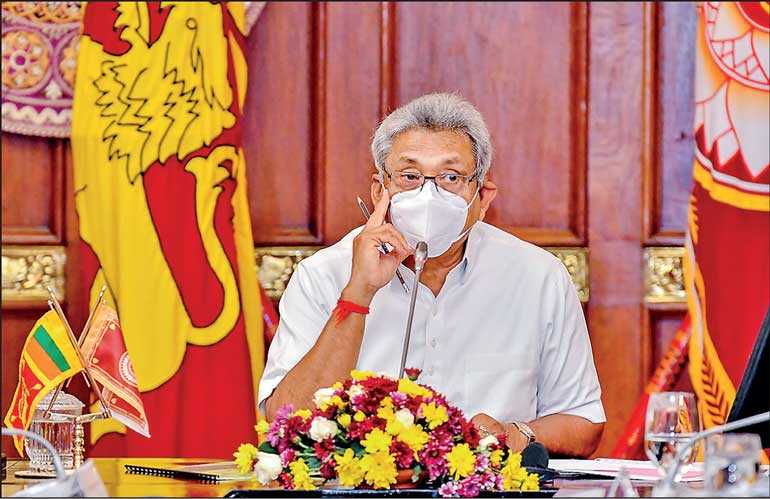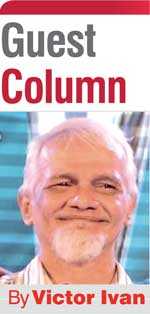Friday Feb 20, 2026
Friday Feb 20, 2026
Friday, 8 January 2021 00:05 - - {{hitsCtrl.values.hits}}

Gotabaya Rajapaksa may have been an outstanding officer who displayed extraordinary skills and talents when he was in the military service, but his advent to the country’s political leadership was abrupt, and without any political experience or political education. Apparently, the President is trying to overcome the crisis of ignorance he faces by pursuing a policy that places more weight on a military style rule than civil administration
Now Sri Lanka is in an unfortunate plight where the State, its socio-political system and economy are in complete collapse and the country is overwhelmed by dark shadows of bankruptcy and anarchy. 
The average living condition of people despite being oppressive still remains virtually tolerable. Yet, it is unavoidable that this situation will soon change for the worse; and consequently the society will lose its ability to function sensibly in proportion to the change.
In the face of this complex crisis, the Gotabaya Rajapaksa Government is in a weak and helpless position without having a pragmatic and forward-looking vision. Under the circumstances, it has shown a tendency towards resorting to the support of the security forces and abstract supernatural powers as a source of strength.
It is also clear that the rich who have borne the cost of election campaign that brought Gotabaya Rajapaksa to power are pursuing a policy of plundering the country to the maximum to recover their expenses.
The crisis of the leadership
The country which President Gotabaya Rajapaksa has been entrusted to rule was not in good shape and easy to rule; on the contrary, it was in a state of extreme degeneration that even a well experienced and capable leader couldn’t manage.
Gotabaya Rajapaksa can be considered as the only leader whose image was blown up artificially to an extreme height of exaggeration by propaganda campaigners in Sri Lanka. They can be said to have contributed to raise the expectations of the unscrupulous people on him as much as the summit of the Himalayan Mountains.
The blowing up of his image may have influenced to enhance the immensity of his victory, but at the same time it has counteracted in depletion of his reputation after the victory, like a deflated balloon.
Gotabaya Rajapaksa may have been an outstanding officer who displayed extraordinary skills and talents when he was in the military service. As Secretary of Defence, in spite of controversial incidents, he has played an important role in coordinating the internal civil war during its final stages.
But his advent to the country’s political leadership was abrupt, and without any political experience or political education. He was not even aware of the changes effected to the Constitution by the 19th Amendment when he contested the election. He did not have in-depth reading of the crisis the country is facing.
From day one of his assuming power, what he has done is follow a policy of systematically doing away with the systems of control that put the rulers to test. Ivor Jennings stated that those who wield power will inevitably be corrupted by power itself when it is not regulated.
Militarisation
Apparently, the President is trying to overcome the crisis of ignorance he faces by pursuing a policy that places more weight on a military style rule than civil administration. Certainly it is not a solution to the crisis the country is facing, and is also not a desirable measure contributing to the benefit or respect of the security forces as well.
A country needs security forces not for its civil administration but the security of the country. The recruits to military service are taught the principles and technology related to security of the country and not the principles and technology relevant to civil administration.
During the period when there was a Cold War between the United States (USA) and Russia (USSR) after World War II, there existed a large number of countries in the world that maintained military rule with the support of either the USA or the USSR. There were military governments in 37 countries in Africa and 22 countries in Latin America.
Sudan is the only country in Africa to have a military government at present and that too is based on an agreement entered into due to internal conflicts over the rise of the people and for a limited period of transition to a civilian rule. The last military government in Asia was in Thailand which ended on 16 July 2019.
President Gotabaya Rajapaksa is experimenting with an outdated doctrine that has been tried and failed by a large number of countries in the world. The damage this experimentation can inflict not only on the country and the security forces, but also on the ruler of the country himself, is immense. It is important that the security forces must refrain from falling into this trap.The Constitution of the country applies equally to the security forces of the country too.
Stupid role of opposition parties
Not only the ruling party, but the opposition movements are also equally responsible for the present deplorable situation of Sri Lanka. It is not the Rajapaksas alone who are responsible for the failure of the country. All political parties represented in Parliament who had been directly or indirectly involved in the regimes that ruled the country are responsible for this situation.
The sectarian divisions based on ethnic, caste and religious differences which eventually led to bloodshedding conflicts, were among major reasons of degeneration of the country; all political parties represented in Parliament can be considered to have directly or indirectly contributed to the perpetuation and growth of these divisions.
The rampant corruption which has overwhelmed the entire institutional system is the next strongest cause of this situation while the plundering of public property by the members of Parliament in collaboration with the presidents of the country who were elected from time to time can be considered as the main reason that had led to rot the country with corruption. But the opposition parties seem to think that the crisis can be overcome by seizing only the power without remedying the root causes of the collapse of the system itself. The public should not allow themselves to be misled by the falsehood displayed by them.
What can be done?
A country needs a collective effort when it is found itself in such an unfortunate situation, to get over the problem. It is only through a strong social dialogue that the country could be directed to adopting such a move.
The political parties are still looking at this issue with self-centred parochial attitudes. Yet, fortunately, there are some people in the country who are capable of perceiving this crisis objectively, broadly and with an incisive vision. If at least, some of them can get together, and express their opinion forcefully, with one voice, certainly it would be possible for them to make a significant difference in the direction of the political path of the country.
Paradoxically, it would be easier to push the country for a desirable transformation when it is found itself in an impasse. It was only after the impasse situation had reached its maximum that the white rulers of South Africa were prepared to abandon the cruel tyranny they had maintained for a very long period. As a result, the doors were opened for adoption of a Participatory Constitution or for making of a People’s Constitution for South Africa. It was through this process that the construction of the nation along with the nation-building was accomplished.
At the moment, Sri Lanka needs such a transformational program. Sri Lanka too, should be directed towards adopting a People’s Participatory Constitution or a People’s Constitution. The Participatory or People’s Constitution model is considered to be the 21st century model of Constitution making.
Yet, surprisingly, the leaders of our country, including Ranil Wickremesinghe, were unaware of this model of Constitution making. Not only the political leaders, most of the professors in Sri Lanka who teach political science also appear to be unaware of this model of Constitution making.
The Participatory or People’s Constitution model is not confined to simply drafting a Constitution. It has the right and the authority to make necessary reforms along with the right to investigate everything that needs to be explored in the country.
This model of constitution making has been empowered by interpretations made in the Charter of Civil and Political Rights of the United Nations while under the International Law it has been recognised as the Constitution making model of the 21st century. It is important that Sri Lanka makes an in-depth study of this model in drafting a new constitution for the country.
With such a program, it would be possible for us to build the modern nation whilst at the same time overcoming the bankruptcy of the country and the breakdown of the institutional system. It must be only after affecting such reforms that Sri Lanka should go for another election.